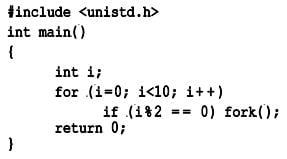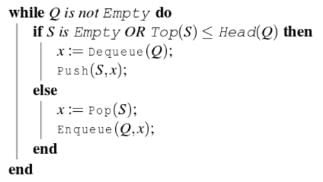Test: Queues - Computer Science Engineering (CSE) MCQ
15 Questions MCQ Test - Test: Queues
Following is C like pseudo code of a function that takes a Queue as an argument, and uses a stack S to do processing.
void fun(Queue *Q)
{
Stack S; // Say it creates an empty stack S
// Run while Q is not empty
while (!isEmpty(Q))
{
// deQueue an item from Q and push the dequeued item to S
push(&S, deQueue(Q));
}
// Run while Stack S is not empty
while (!isEmpty(&S))
{
// Pop an item from S and enqueue the poppped item to Q
enQueue(Q, pop(&S));
}
}
Q.
What does the above function do in general?
{
Stack S; // Say it creates an empty stack S
while (!isEmpty(Q))
{
// deQueue an item from Q and push the dequeued item to S
push(&S, deQueue(Q));
}
while (!isEmpty(&S))
{
// Pop an item from S and enqueue the poppped item to Q
enQueue(Q, pop(&S));
}
}
Q.
What does the above function do in general?
Which one of the following is an application of Queue Data Structure?
How many stacks are needed to implement a queue. Consider the situation where no other data structure like arrays, linked list is available to you.
How many queues are needed to implement a stack. Consider the situation where no other data structure like arrays, linked list is available to you.
A priority queue can efficiently implemented using which of the following data structures? Assume that the number of insert and peek (operation to see the current highest priority item) and extraction (remove the highest priority item) operations are almost same.
Which of the following is true about linked list implementation of queue?
Suppose a circular queue of capacity (n – 1) elements is implemented with an array of n elements. Assume that the insertion and deletion operation are carried out using REAR and FRONT as array index variables, respectively. Initially, REAR = FRONT = 0. The conditions to detect queue full and queue empty are
A Priority-Queue is implemented as a Max-Heap. Initially, it has 5 elements. The level-order traversal of the heap is given below: 10, 8, 5, 3, 2 Two new elements ”1‘ and ”7‘ are inserted in the heap in that order. The level-order traversal of the heap after the insertion of the elements is:
An implementation of a queue Q, using two stacks S1 and S2, is given below:
Q. Let n insert and m (<=n) delete operations be performed in an arbitrary order on an empty queue Q. Let x and y be the number of push and pop operations performed respectively in the process. Which one of the following is true for all m and n?
The following C program is executed on a unix/Linux is:

The total number of child processes created is ______
Consider the following pseudo code. Assume that IntQueue is an integer queue. What does the function fun do?
Consider the following operation along with Enqueue and Dequeue operations on queues, where k is a global parameter.
Q. What is the worst case time complexity of a sequence of n MultiDequeue() operations on an initially empty queue?
Suppose implementation supports an instruction REVERSE, which reverses the order of elements on the stack, in addition to the PUSH and POP instructions. Which one of the following statements is TRUE with respect to this modified stack?
A queue is implemented using an array such that ENQUEUE and DEQUEUE operations are performed efficiently. Which one of the following statements is CORRECT (n refers to the number of items in the queue)?
Let Q denote a queue containing sixteen numbers and S be an empty stack. Head(Q) returns the element at the head of the queue Q without removing it from Q. Similarly Top(S) returns the element at the top of S without removing it from S. Consider the algorithm given below.

Q. The maximum possible number of iterations of the while loop in the algorithm is______
[This Question was originally a Fill-in-the-Blanks question]



















